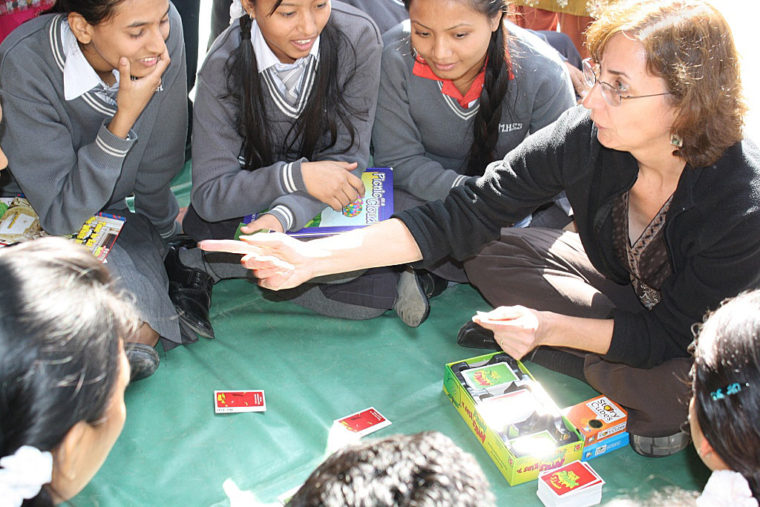The outdoor basketball court was a riot of color as Nepalese children knelt around it, painting stories on posters. Cathy Raymond, the assistant director of English Language Programs in the Office of International Students and Scholars at Washington University, remembers the atmosphere as “electric.” She was traveling with the American Corners Book Bus to schools around Nepal. At each stop, children would play games, write poetry, read or talk about climate change. Raymond counts the children painting on the basketball court as one of her most memorable experiences.
It was November 2014, and Raymond, who has also worked in Germany and Russia, was in Nepal as an English Language Specialist for the State Department.
There she worked with the U.S. embassy to write a handbook to help the regional American Corners with their culture and language programming. The American Corners are libraries affiliated with the U.S. embassy that do outreach in the community, such as organizing cultural comparison activities.
“The intent of these activities is to foster international understanding and increase awareness between the United States and different countries,” Raymond says. By engaging in Nepalese culture, Raymond herself gained a greater cultural understanding that informed both her project and her worldview.
Over the course of the month she spent there, Raymond became friends with the Nepali staff at the embassy. They taught her customs, showed her the area on walks, and invited her to their homes for meals and holidays. “These insights helped me shape the handbook I was writing,” Raymond says.
“I strengthened my belief that education is the most important tool the world has for creating individual and world peace.”
Cathy Raymond
In addition to Nepal, Raymond has been doing work in Afghanistan and with Afghan educators for nearly 11 years. Raymond originally began working with Afghans while the director of language materials development at the Center for Languages of the Central Asian Region (CELCAR) at Indiana University in Bloomington.
She first worked on a Fulbright Educational Exchange program with Indiana University and Kabul Education University. As part of the exchange, Raymond conducted teacher training and developed workshops with a group of four Afghan educators
During this time, “I strengthened my belief that education is the most important tool the world has for creating individual and world peace,” Raymond says.
After that initial project, Raymond went to Afghanistan to interview candidates for a master’s degree program, also housed at Indiana University. Raymond also taught courses and tutored the students for the entirety of the two-year program. “When they graduated, it was such a moving experience, because I knew everything that had gone into it for them,” she says.
The experience inspired her to continue working with Afghans. “Once I finished my work on the Afghan Higher Education Program, I started working as a volunteer for the Alliance for International Women’s Rights as an English teacher, and I eventually stepped into the position of English language program director,” she says.
The Alliance for International Women’s Rights partnered with the Afghan Higher Education Program to provide English language training for women and girls. The program matches students with English teachers on a one-on-one basis, and the pairs communicate biweekly through Skype sessions. The program has been highly successful.
Raymond’s experience has informed her work at the university where she teaches courses in conversation and academic writing.
“Cathy’s experience stands out because of its broad impact,” says Karen Schwelle, director of the English Language Programs. “The projects in Afghanistan and Nepal are not just about teaching English but about improving access to educational opportunities.”
Raymond will continue working with Afghans and is starting a similar mentoring program for women in Nepal. “I feel that it is vital to continue offering educational support to the girls and women around the world,” Raymond says.
